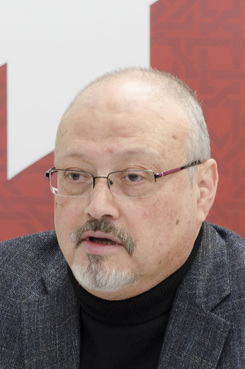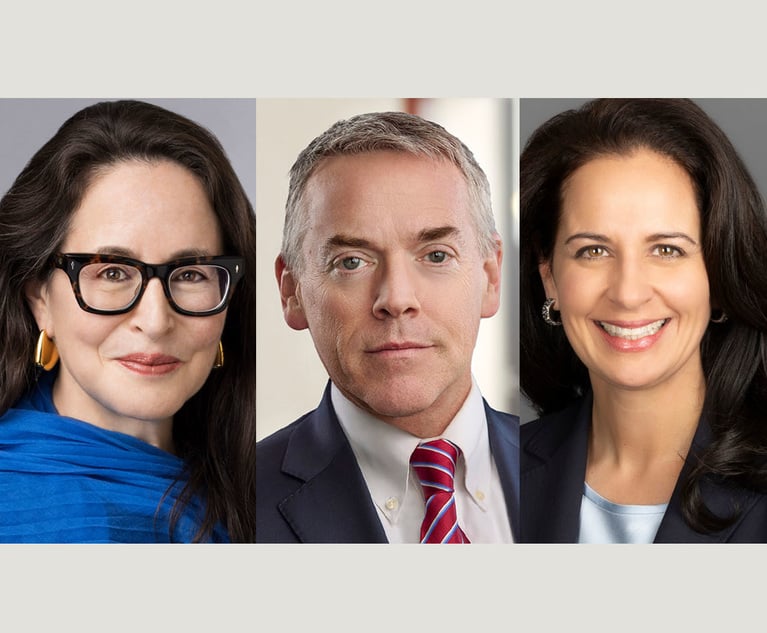Global Arbitration Lawyers Flock to Saudi Arabian Conference Amidst Boycott
As "Davos in the Desert" dries up due to the controversy surrounding Jamal Khashoggi, international arbitration lawyers from around the world were scheduled to rub elbows with Saudi leadership at another conference down the road.
October 16, 2018 at 04:53 PM
4 minute read
The original version of this story was published on The American Lawyer
 Riyadh, Saudi Arabia. (Photo: HansMusa/Shutterstock.com)
Riyadh, Saudi Arabia. (Photo: HansMusa/Shutterstock.com)
Thanks to their decision to stay home, JPMorgan Chase's Jamie Dimon, Blackstone's Steve Schwarzman and BlackRock's Larry Fink have helped to make the Saudi government's so-called Davos in the Desert investment conference a household name.
Responding to the alleged murder of Saudi Arabian journalist Jamal Khashoggi, the CEOs and other media and tech luminaries announced they would not participate in next week's Future Investment Initiative in Riyadh.
But the Saudi Center of International Arbitration's first international conference—which featured a handful of arbitration leaders at top international firms along with members of the Saudi cabinet—managed to fly under the radar just down the road.
The timing of the event meant that lawyers from King & Spalding, Norton Rose Fulbright, White & Case and other firms, along with leadership from the American Arbitration Association, were scheduled to brush shoulders in Riyadh on Monday and Tuesday with a member of the Saudi royal family and multiple cabinet officials while questions swirled about whether Saudi agents had been sent to Turkey to kill and dismember the Washington Post columnist.
 Jamal Khashoggi disappeared after entering the Saudi consulate in Istanbul on Oct. 2. (Photo credit: POMED via Wikimedia Commons)
Jamal Khashoggi disappeared after entering the Saudi consulate in Istanbul on Oct. 2. (Photo credit: POMED via Wikimedia Commons)The list of speakers included Prince Dr. Abdulaziz bin Sattam al Saud, and the Saudi ministers of Labor and Social Development, Justice, and Commerce & Investment. They were to be joined by a list of arbitration experts from around the world including UAE-based King & Spalding partner Adrian Cole, Norton Rose Fulbright international arbitration global co-head Mark Baker, and White & Case international arbitration head Paul Friedland.
“It was an honor to speak on the topic of cross examination at the Saudi Center of Commercial Arbitration's first international conference,” Baker said in an email. “This important conference on international arbitration and mediation was attended by more than 750 ministers, academics and lawyers.”
Representatives of King & Spalding and White & Case did not respond to inquiries about whether their attorneys ultimately participated.
The list also featured AAA CEO India Johnson and general counsel Eric Tuchmann. An AAA representative also did not respond to an inquiry about their participation.
King & Spalding, Norton Rose Fulbright and White & Case are all among a short list of U.S.-based firms with substantial ties to Saudi Arabia. Saudi rules prevent international law firms from operating in the country without a local partner firm. King & Spalding's alliance dates to 2006, and Norton Rose Fulbright has been there since 2005. White & Case, which handles significant work for state-owned Saudi Aramco, arrived in 1989.
More recently, Mayer Brown and Hogan Lovells announced tie-ups in the country earlier this year.
Hogan Lovells is one of several U.S. firms that have also done U.S. lobbying work for Saudi Arabia in the last year. In June, senior counsel Norm Coleman, the former Minnesota Republican senator, signed an agreement with a $125,000 monthly retainer for the entirety of 2018.
In August, Gibson, Dunn & Crutcher partner Theodore Olson agreed to put in time, including the preparation of an op-ed, opposing the proposed “No Oil Producing and Exporting Cartels Act” for a flat fee of $250,000. The bill, which was introduced this year in the U.S. House of Representatives, would expose OPEC to U.S. prosecution for any antitrust violations.
Brownstein Hyatt Farber Schreck also has an open lobbying relationship with the Kingdom, extending through the end of 2018, also at $125,000 monthly.
Representatives from all three firms did not respond to requests for comment.
Read More:
Gibson Dunn's Ted Olson Registers as Foreign Agent for Saudi Arabia
This content has been archived. It is available through our partners, LexisNexis® and Bloomberg Law.
To view this content, please continue to their sites.
Not a Lexis Subscriber?
Subscribe Now
Not a Bloomberg Law Subscriber?
Subscribe Now
NOT FOR REPRINT
© 2025 ALM Global, LLC, All Rights Reserved. Request academic re-use from www.copyright.com. All other uses, submit a request to [email protected]. For more information visit Asset & Logo Licensing.
You Might Like
View All
Firms Come Out of the Gate With High-Profile Litigation Hires in 2025

2024 Marked Growth On Top of Growth for Law Firm Litigation Practices. Is a Cooldown in the Offing for 2025?

Big Company Insiders See Technology-Related Disputes Teed Up for 2025

Litigation Leaders: Jason Leckerman of Ballard Spahr on Growing the Department by a Third Via Merger with Lane Powell
Trending Stories
- 1Ex-Starbucks GC Exiting Latest Role, Will Get Severance
- 2Family Law Special Section 2025
- 3We Must Uphold the Rights of Immigrant Students
- 4Orrick Picks Up 13-Lawyer Tech, VC Group From Gunderson Dettmer
- 5How Alzheimer’s and Other Cognitive Diseases Affect Guardianship, POAs and Estate Planning
Who Got The Work
J. Brugh Lower of Gibbons has entered an appearance for industrial equipment supplier Devco Corporation in a pending trademark infringement lawsuit. The suit, accusing the defendant of selling knock-off Graco products, was filed Dec. 18 in New Jersey District Court by Rivkin Radler on behalf of Graco Inc. and Graco Minnesota. The case, assigned to U.S. District Judge Zahid N. Quraishi, is 3:24-cv-11294, Graco Inc. et al v. Devco Corporation.
Who Got The Work
Rebecca Maller-Stein and Kent A. Yalowitz of Arnold & Porter Kaye Scholer have entered their appearances for Hanaco Venture Capital and its executives, Lior Prosor and David Frankel, in a pending securities lawsuit. The action, filed on Dec. 24 in New York Southern District Court by Zell, Aron & Co. on behalf of Goldeneye Advisors, accuses the defendants of negligently and fraudulently managing the plaintiff's $1 million investment. The case, assigned to U.S. District Judge Vernon S. Broderick, is 1:24-cv-09918, Goldeneye Advisors, LLC v. Hanaco Venture Capital, Ltd. et al.
Who Got The Work
Attorneys from A&O Shearman has stepped in as defense counsel for Toronto-Dominion Bank and other defendants in a pending securities class action. The suit, filed Dec. 11 in New York Southern District Court by Bleichmar Fonti & Auld, accuses the defendants of concealing the bank's 'pervasive' deficiencies in regards to its compliance with the Bank Secrecy Act and the quality of its anti-money laundering controls. The case, assigned to U.S. District Judge Arun Subramanian, is 1:24-cv-09445, Gonzalez v. The Toronto-Dominion Bank et al.
Who Got The Work
Crown Castle International, a Pennsylvania company providing shared communications infrastructure, has turned to Luke D. Wolf of Gordon Rees Scully Mansukhani to fend off a pending breach-of-contract lawsuit. The court action, filed Nov. 25 in Michigan Eastern District Court by Hooper Hathaway PC on behalf of The Town Residences LLC, accuses Crown Castle of failing to transfer approximately $30,000 in utility payments from T-Mobile in breach of a roof-top lease and assignment agreement. The case, assigned to U.S. District Judge Susan K. Declercq, is 2:24-cv-13131, The Town Residences LLC v. T-Mobile US, Inc. et al.
Who Got The Work
Wilfred P. Coronato and Daniel M. Schwartz of McCarter & English have stepped in as defense counsel to Electrolux Home Products Inc. in a pending product liability lawsuit. The court action, filed Nov. 26 in New York Eastern District Court by Poulos Lopiccolo PC and Nagel Rice LLP on behalf of David Stern, alleges that the defendant's refrigerators’ drawers and shelving repeatedly break and fall apart within months after purchase. The case, assigned to U.S. District Judge Joan M. Azrack, is 2:24-cv-08204, Stern v. Electrolux Home Products, Inc.
Featured Firms
Law Offices of Gary Martin Hays & Associates, P.C.
(470) 294-1674
Law Offices of Mark E. Salomone
(857) 444-6468
Smith & Hassler
(713) 739-1250






